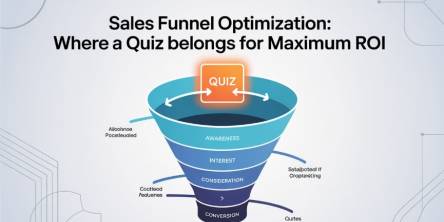Amplifying Your Online Presence and Implement AI

With 84% of businesses leveraging AI to establish a competitive edge, it's evident that AI is reshaping the digital landscape. This guide will explore how AI can elevate your existing website and mobile app, making them more responsive and user-centric.
We will break down complex AI concepts into practical, actionable insights and guide you through strategic implementations. Embark on this transformative journey to fully utilize AI to enhance your digital platforms.
Strategic Implementation of AI in Mobile Apps
The impact of AI on mobile apps extends far beyond basic functionality enhancements. By incorporating AI, apps become highly personalized and efficient communication tools. AI enables sophisticated data analysis of user behaviors, which can be used to tailor the app experience to individual needs.
For example, incorporating AI chatbots can revolutionize customer service, providing instant and tailored responses. Similarly, employing machine learning to analyze user interactions can help predict future behaviors and preferences, allowing for more targeted content delivery. Remember, the successful deployment of AI requires a focused approach, starting with areas where it can most effectively improve user engagement and operational efficiency.
Implement Artificial intelligence to begin in high-impact areas, with continuous testing and refinement to optimize its benefits. While AI integration involves complexity, the potential to enhance user satisfaction and streamline app performance makes it an invaluable tool for any digital strategy.
Planning Your AI Integration in Mobile and Web Applications
To successfully integrate AI into your existing web and mobile applications, start by defining objectives for what you hope to achieve through AI. It could range from automating routine interactions to leveraging analytics for deeper business insights. Determine which aspects of your business will benefit most from AI enhancements.
Check the technical feasibility of integrating AI into your app. It involves assessing whether your current system can support AI’s computational demands and whether the user interface allows adding AI-driven elements.
Explore the variety of AI technologies available, noting that each comes with its requirements for integration and maintenance. This understanding will help in resource planning and scheduling implementation phases.
Also, evaluate how AI will change the user experience. The integration should streamline and enrich user interactions, not complicate them.
Diverse Industry Applications of AI
We will also examine how AI is applied across different sectors, significantly enhancing app functionalities. AI's versatility is evident from healthcare apps utilizing AI for efficient patient care to educational apps that adapt content to individual learning styles, fintech apps that secure financial operations, and e-commerce apps that personalize the shopping experience. This analysis will provide a deeper understanding of how AI can be strategically applied to enhance efficiency and user engagement.
AI's Impact on Education Mobile Apps
Artificial intelligence is reshaping education mobile apps by offering personalized learning experiences, automating administrative tasks, and providing valuable insights to educators. With AI's adaptive learning algorithms, these apps can tailor content and assessments to match individual students' unique needs and learning styles, fostering engagement and academic success.
For instance, AI-powered educational apps can analyze student performance data to identify areas for improvement and provide targeted interventions to support learning. Additionally, AI can automate grading tasks, allowing educators to focus on delivering personalized feedback and student support.
It is essential to prioritize user experience, data privacy, and ethical considerations to maximize the benefits of AI in education apps. By harnessing the power of AI, education apps can improve learning outcomes, promote student success, and facilitate lifelong learning experiences.
AI's Influence on Healthcare Mobile Apps
Artificial intelligence is revolutionizing healthcare mobile apps by enabling advanced diagnostics, personalized treatment plans, and proactive patient monitoring. These apps can use AI's predictive analytics to analyze patient data in real time, providing clinicians with valuable insights to enhance decision-making and patient outcomes.
For example, AI algorithms can swiftly interpret medical images, aiding in the early detection of diseases and abnormalities. Moreover, AI-powered monitoring systems enable continuous tracking of patients' health metrics, facilitating timely interventions and customized care plans tailored to individual needs.
Successful integration of AI into healthcare apps requires robust infrastructure capable of handling complex data processing tasks and ensuring seamless integration with existing healthcare systems. Harnessing the power of AI in healthcare apps can improve efficiency, accuracy, and patient satisfaction, ultimately revolutionizing the delivery of healthcare services.
Transform Your Mobile App with AI
We lead the revolution in AI integration for mobile apps, offering unmatched expertise and efficiency. With a comprehensive understanding of AI capabilities, they simplify complex concepts, making AI implementation accessible and impactful.
Their seasoned team leverages pre-built AI models to expedite integration while tailoring solutions to your app's specific needs. Whether it's voice recognition, image analysis, or predictive analytics, we deliver customized solutions that ensure superior performance.
Throughout the integration journey, you retain control, defining the AI features and functionalities that align with your app's objectives. Understanding the significance of purpose-driven AI solutions, we ensure that your app benefits from functionalities that are innovative and deeply aligned with your business strategy.
Similar Articles
In 2026, Microsoft Excel continues to power the U.S. business ecosystem, supporting over 80% of financial modeling, 70% of operational reporting, and nearly 65% of analyst-driven decision workflows across enterprises.
The rapidly growing volume and speed of digital transactions have had a whole lot of implications for businesses
We live in the age of cloud computing. That's plain to see. However, what may escape many are the operational and financial challenges of managing multiple independent clusters.
Times have changed and how! Take modern technology and the fast-paced digital economy, it is driving. Given the market conditions, any company's infrastructure has become more than just a technical detail.
It has been for everyone to see that the modern digital economy is distinguished by high volume, real-time financial transactions.
Business success has become reliant on efficiency and agility of the underlying technology infrastructure. Clearly, companies now depend on cloud computing to provide seamless services while managing exponential data growth.
Hospitals operate in environments where availability and patient safety are paramount at all times. As medical supply chains expand and regulatory oversight becomes more demanding, manual tracking methods introduce delays and risk.
Every sales funnel has one core goal: turn attention into revenue as efficiently as possible. Yet many funnels leak value at critical stages—visitors bounce, leads go cold, and sales teams chase prospects who were never a good fit.
Decentralized Finance (DeFi) has transformed how users earn passive income through blockchain-based financial systems. Among its most popular use cases,









